Your Jeep may smell like burning rubber due to a leaking engine, worn-out belts, or overheating brakes. Addressing the issue promptly is essential for safe driving and preventing further damage to your vehicle.
If you notice your Jeep smelling like burning rubber, there are several potential causes to consider. It could be indicative of a leaking engine, worn-out belts, or overheating brakes. Identifying and addressing the root cause promptly will not only ensure your safety on the road but also prevent further damage to your vehicle.
We will explore the common reasons why your Jeep may be emitting a burning rubber odor and provide insights on how to resolve the issue effectively. Understanding these potential causes can help you take the necessary steps to maintain your vehicle’s performance and reliability.
Possible Causes Of Burning Rubber Smell In Your Jeep
i. Engine Compartment Issues
It’s never a pleasant experience when you step into your Jeep and are immediately greeted by the smell of burning rubber. The question is, why does this smell occur? In this section, we will explore the various engine compartment issues that could be contributing to the burning rubber odor in your beloved Jeep.
1. Overheating Engine
One potential cause of the burning rubber smell in your Jeep could be an overheating engine. When the engine gets too hot, certain components can start to deteriorate, creating a rubbery scent. This smell is often accompanied by other signs of overheating, such as a high-temperature gauge or steam coming from under the hood.
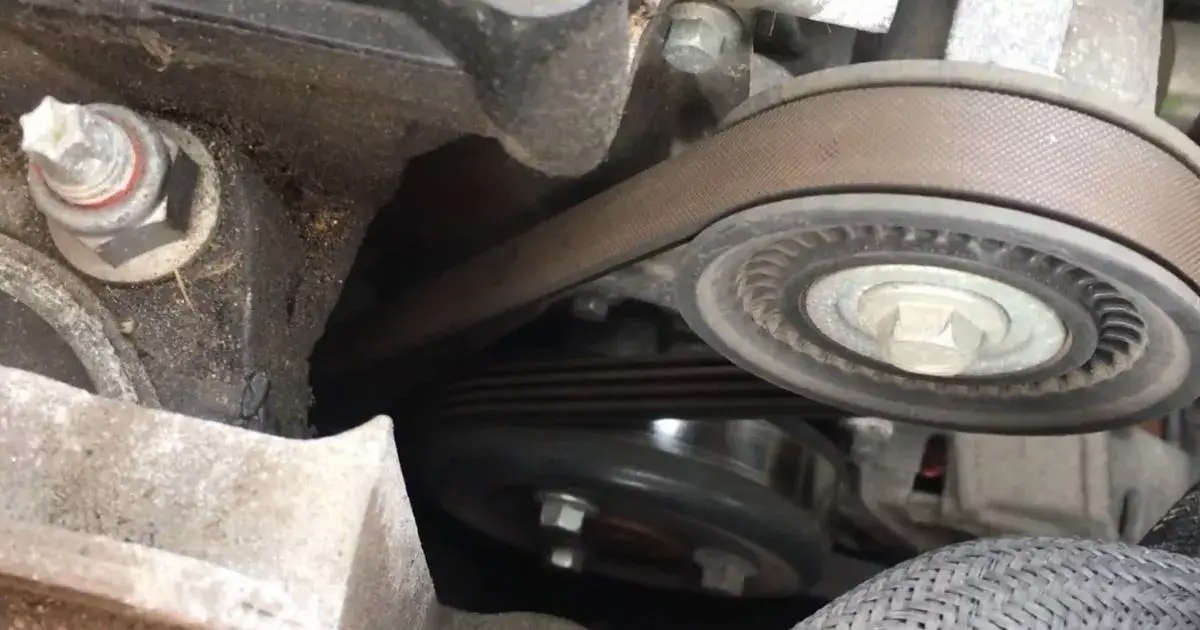
2. Belt Issues (e.g., Worn-out Or Slipping Serpentine Belt)
Moving on, another common culprit behind the burning rubber smell is belt issues, specifically a worn-out or slipping serpentine belt. The serpentine belt is responsible for powering various engine accessories, like the alternator and power steering pump. Over time, this crucial belt can become worn-out or start slipping, leading to friction and that distinct rubbery odor.
3. Leaking Fluids Onto Hot Engine Parts
The final potential cause we’ll touch on is leaking fluids onto hot engine parts. Your Jeep relies on various fluids, such as coolant and oil, to keep everything lubricated and operating smoothly. However, if there’s a leak in any of these fluids, they can come into contact with hot engine components, causing them to burn and emit a smell akin to burning rubber. It’s important to address any leaks promptly to prevent further damage.
ii. Brake System Problems
Jeep smelling like burning rubber could indicate brake system problems. Potential causes may include worn brake pads, overheating brakes, or a malfunctioning brake caliper. It is essential to have the brake system inspected and repaired to ensure safe driving conditions.
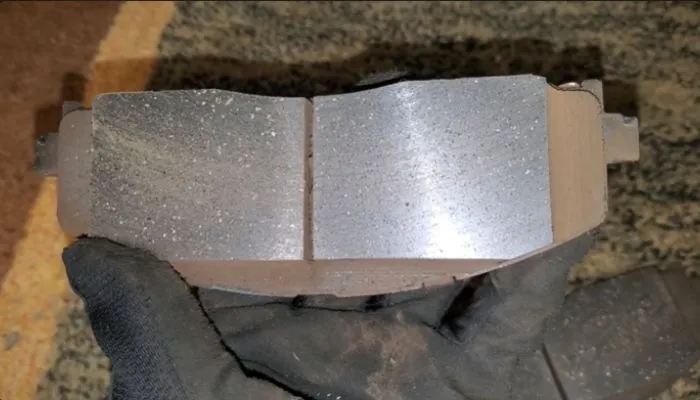
1. Worn Brake Pads
One possible cause of your Jeep smelling like burning rubber is worn brake pads. Brake pads are essential components of the brake system that grip the brake rotors to slow down or halt the movement of your vehicle. Over time, these pads can wear down due to friction and heat, resulting in less effective braking and a burning rubber smell.
When the brake pads become thin and close to wearing out completely, they can start rubbing against the metal brake rotors. This friction generates heat, causing the rubber material of the brake pads to burn and emit a distinct odor. If you notice a burning rubber smell coming from your Jeep, inspecting the brake pads should be one of the first actions you take.
Regularly checking the thickness of your brake pads and replacing them when necessary is crucial for maintaining a reliable braking system. By doing so, you can prevent further damage to the rotors and ensure optimal braking performance.
2. Overheated Brake Components
Another possible cause of a burning rubber smell in your Jeep is overheated brake components. The brake system generates a significant amount of heat during operation, especially during prolonged or aggressive braking.
If the brakes are frequently subjected to intense heat, such as when driving down steep inclines or towing heavy loads, the excessive heat can cause certain brake components to overheat. This includes the brake rotors, brake pads, and other associated parts.
When these components become overheated, the rubber material of the brake pads can melt or deteriorate, leading to a burning rubber smell. Additionally, the heat can also affect the brake fluid, causing it to boil and produce a distinct odor.
To prevent overheating of the brake system, it is important to drive cautiously, especially when descending hills or carrying heavy loads. Adequate cooling time for the brakes between intense braking episodes can also help reduce the chances of overheating and the accompanying burning rubber smell.
Also Read: Why Does My Jeep Smell Like Rotten Eggs
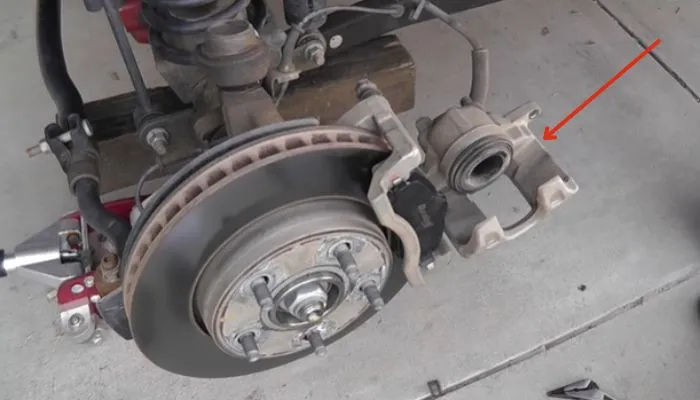
3. Stuck Brake Caliper
A stuck or malfunctioning brake caliper can also be a possible cause of the burning rubber smell in your Jeep. The brake calipers are responsible for holding and pressing the brake pads against the rotors to create the necessary friction for stopping or slowing down your vehicle.
If a brake caliper gets stuck in the engaged position, it means that the brake pad continues to press against the rotor even when you’re not applying the brakes. This constant contact produces excessive heat, which can cause the rubber material of the brake pad to burn and emit a distinct odor.
In addition to the burning rubber smell, symptoms of a stuck caliper may include uneven brake pad wear, decreased braking performance, and increased fuel consumption due to the constant drag on the wheel.
If you suspect a malfunctioning brake caliper, it is important to have it inspected and repaired by a qualified mechanic as soon as possible. Ignoring this issue can lead to further damage to the brake system, reduced control of your vehicle, and potential safety hazards.
iii. Electrical System Malfunctions
When it comes to understanding why your Jeep smells like burning rubber, addressing possible causes related to electrical system malfunctions is essential. Electrical issues can lead to overheating and burning of wires or insulation, resulting in the distinct smell of burning rubber. Identifying and resolving these problems is crucial for the safety and performance of your vehicle.
1. Short Circuits
A short circuit in the electrical system of your Jeep can cause a burning rubber smell. When an electrical current follows an unintended path due to a damaged wire or component, it generates excess heat.
This heat can melt the surrounding insulation or rubber components, leading to the distinctive smell of burning rubber. Identifying and repairing any short circuits is vital for maintaining the safety and functionality of your vehicle.
2. Melting Wires Or Insulation
Another potential cause of the burning rubber smell in your Jeep is melting wires or insulation within the electrical system. This can occur due to overheating caused by faulty components, excessive electrical load, or inadequate insulation material. When wires or insulation begin to melt, the distinct odor of burning rubber can become noticeable.
Detecting and addressing issues related to melting wires or insulation is crucial for preventing potential electrical fires and ensuring the proper functioning of your Jeep’s electrical system.

Credit: www.autotechiq.com
iv. Mechanical Issues
When it comes to a burning rubber smell in your Jeep, it can be unsettling and point to potential mechanical issues that need attention. Other than the commonly known causes, there are accidental mechanical issues which can also lead to this smell. Let’s take a closer look at some possible causes related to other mechanical issues.
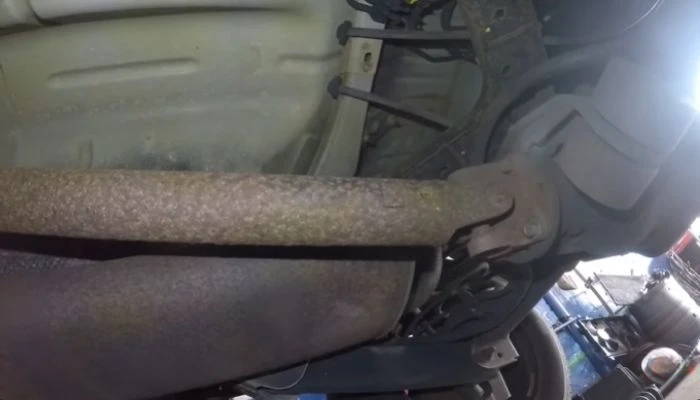
1. Damaged Or Misaligned Drivetrain Components
If the drivetrain components such as the driveshaft, universal joints, or differential are damaged or misaligned, it can result in friction and overheating, leading to a burning rubber odor. It’s essential to have these components inspected and repaired by a professional mechanic to prevent further damage and safety risks.
2. Friction Or Rubbing Against Plastic Components
In some cases, the burning rubber smell could be caused by friction or rubbing between metal components and plastic parts, such as the wheel well liners or undercarriage shields. Over time, this friction can produce a burning odor. Inspecting these plastic components for damage or misalignment and addressing any issues can help eliminate the smell.
3. Foreign Object Lodged In The Undercarriage
A foreign object lodged in the undercarriage of the Jeep, such as a plastic bag or debris, can come into contact with hot parts of the vehicle, resulting in a burning rubber odor. Examining the undercarriage and removing any foreign objects can alleviate the smell and prevent potential damage to the vehicle.
Steps To Address The Burning Rubber Smell
i. Safety Precautions
If you’re wondering why your Jeep smells like burning rubber, it’s important to take safety precautions. Follow these steps to address the issue and ensure the safety of yourself and your vehicle.
The smell of burning rubber in your Jeep can be concerning, but it’s important to address the issue promptly to ensure your safety on the road. Before diving into the investigation, it’s crucial to follow these safety precautions to prevent any accidents or injuries.
By following these steps, you’ll be able to identify the source of the burning rubber smell and take appropriate action. Remember, safety comes first!
1. Park The Jeep In A Safe Location
As soon as you notice the smell of burning rubber, find a safe location to pull over and park your Jeep. Look for a wide shoulder, an empty parking lot, or any other area where you’ll be out of the flow of traffic. This will minimize the risk of any accidents while you’re investigating the problem.
2. Allow Sufficient Cooling Time Before Inspection
Once your Jeep is safely parked, resist the urge to jump right into inspecting the source of the smell. Burning rubber often indicates a heating issue, so it’s crucial to let your vehicle cool down before proceeding. Give it ample time to cool off completely to avoid any burns or injuries. This will also provide a more accurate assessment of the problem.
3. Inspection
After allowing sufficient cooling time, you can now proceed with the inspection. While investigating, make sure the engine is turned off to prevent any accidents. Here are a few areas to focus on:
- Check the tires: Examine each tire for signs of damage such as worn treads, punctures, or bulges. The burning rubber smell could be an indication of a tire issue or rubbing against the fender or other parts.
- Inspect the brakes: Brake pads and calipers can create a burning rubber smell if they are worn out or sticking. Look for any signs of excessive heat or unusual wear on the braking system components.
- Examine the engine components: Inspect belts, hoses, and other engine parts for signs of wear, damage, or rubbing. Loose or worn belts rubbing against engine components can produce the distinct burning rubber smell you’re experiencing.
4. Seek Professional Help If Needed
If you’re unable to find the source of the burning rubber smell or if you’re unsure about performing the necessary repairs, it’s best to seek assistance from a qualified mechanic. They have the expertise and tools to diagnose and fix the issue effectively, ensuring your Jeep is back on the road in no time.
Remember, maintaining the safety of yourself and other drivers is the utmost priority when dealing with any automotive issues. Follow these steps to address the burning rubber smell in your Jeep, and be proactive in seeking professional help when necessary.

Credit: www.wranglerforum.com
ii. Visual Inspection
When your Jeep starts emitting a burning rubber smell, it’s essential to take action promptly. Ignoring the issue can lead to more significant problems and potentially put your safety at risk. Below we will walk you through the steps of conducting a visual inspection to identify the source of the burning rubber smell in your Jeep, ensuring a quick and effective resolution.
1. Check Engine Compartment For Signs Of Overheating Or Leaks
Inspecting the engine compartment is the first step in identifying the cause of the burning rubber smell in your Jeep. Here’s what you need to do:
- Start by popping the hood and allowing the engine to cool down for a few minutes.
- Once the engine has cooled, closely examine the engine components for any signs of overheating or leaks.
- Look for any loose or damaged hoses or belts that could be causing the burning rubber smell.
- Check the radiator and the surrounding areas for any signs of coolant leaks.
If you notice any issues during this visual inspection, such as damaged belts or leaks, it’s crucial to address them promptly. Consider consulting a professional mechanic for advice or assistance.
2. Inspect Brake Components For Wear Or Damage
Faulty or worn-out brake components can also be a common cause of the burning rubber smell in your Jeep. Follow these steps to inspect the brake system:
- Start by safely raising your vehicle using a jack and secure it with jack stands.
- Remove the wheels to gain access to the brake components.
- Inspect the brake pads, rotors, and calipers for any signs of wear, damage, or overheating.
- Check for any loose or sticking brake components that may be causing excessive friction.
If you notice worn-out or damaged brake components, it’s crucial to have them replaced immediately. Driving with faulty brakes can be extremely dangerous and compromise your vehicle’s performance.
3. Examine Electrical Wiring For Melting Or Charring
The burning rubber smell in your Jeep can also be caused by electrical issues. Follow these steps to inspect the electrical wiring:
- Start by disconnecting the battery to ensure your safety.
- Inspect the wiring harnesses, connectors, and other electrical components for any signs of melting, charring, or damage.
- Look for any loose connections or frayed wires that could be causing a short circuit.
- Pay special attention to areas near hot engine components or exhaust pipes where wiring may be susceptible to heat damage.
If you discover any electrical issues during the inspection, it’s crucial to have them repaired or replaced by a qualified electrician or mechanic. Ignoring electrical problems can lead to serious malfunctions and potential hazards.
iii. Testing And Diagnosis
One of the concerns that many Jeep owners may encounter is a burning rubber smell. This unusual odor can be a cause for worry as it may indicate an underlying issue in your vehicle. To address this problem, it is important to take the proper steps for testing and diagnosis. By following these procedures, you can pinpoint the source of the smell and take appropriate action to resolve the issue.
1. Test Drive To Observe Any Unusual Sounds Or Performance Issues
Before diving into diagnostic tools, it is recommended to start with a thorough test drive. This will help you observe any unusual sounds or performance issues that may be connected to the burning rubber smell.
During the test drive, pay close attention to how the Jeep handles, whether there are any strange vibrations, or if you hear any unfamiliar noises. These signs can provide valuable clues about the origin of the burning rubber smell and help guide your next steps.
2. Utilize Diagnostic Tools To Identify Specific Problems
A key step in addressing the burning rubber smell is to utilize diagnostic tools. These tools can help identify specific problems within your Jeep that may be responsible for the odor. Common diagnostic tools used include an OBD-II scanner and a multimeter.
The OBD-II scanner can read error codes stored in your Jeep’s onboard computer, providing valuable information about any potential issues.
A multimeter, on the other hand, can be used to measure electrical voltages and test various components of your vehicle. By using these tools correctly, you can narrow down the possible causes of the burning rubber smell and make a more accurate diagnosis.
iv. Repair Or Maintenance Actions
If you’ve noticed a strong, unpleasant burning rubber smell coming from your Jeep, it’s important to take action as soon as possible. Ignoring this issue can lead to more severe problems and potential safety hazards.
Fortunately, there are several steps you can take to address the burning rubber smell, either through repair or maintenance actions. By following these steps, you can identify and resolve the root cause of the smell, ensuring your Jeep remains in good working condition.
1. Replace Worn Or Damaged Components
To begin addressing the burning rubber smell in your Jeep, start by inspecting and replacing any worn or damaged components within the vehicle. Over time, various parts of your Jeep’s engine or drivetrain can wear down, leading to friction and potentially causing the rubber smell. Some common culprits include worn-out belts, hoses, or gaskets.
To pinpoint the exact component responsible for the burning rubber smell, visually inspect the engine compartment. Look for signs of wear, such as cracks or tears in belts or hoses. If you notice any damaged components, make sure to replace them promptly. It’s important to use high-quality replacement parts to ensure long-lasting performance and to prevent further issues.
2. Address Fluid Leaks And Repair Electrical Wiring
Another potential cause of the burning rubber smell could be fluid leaks or malfunctioning electrical wiring within your Jeep. Leaking oil, coolant, or other fluids can come into contact with hot engine parts, emitting a burning rubber odor as they heat up. In addition, exposed or damaged electrical wiring can lead to overheating, resulting in the same smell.
To address fluid leaks, inspect the engine and underside of your Jeep for any signs of leakage. If you notice any fluid pooling or dripping, identify the source and repair the leak promptly. Similarly, if you suspect electrical issues, visually inspect the wiring for any damage or exposed wires. Repair or replace any faulty wiring to ensure the electrical system is functioning correctly.
3. Ensure Proper Alignment And Functioning Of Drivetrain Parts
A misaligned drivetrain or malfunctioning drivetrain parts can also contribute to the burning rubber smell in your Jeep. This can occur when the weight distribution or alignment of the wheels and axles is off, causing excessive tire wear and friction.
To address this issue, take your Jeep to a reputable mechanic or alignment specialist. They will assess the alignment of your wheels, axles, and other drivetrain components, making any necessary adjustments or repairs. Ensuring that your drivetrain parts are properly aligned and functioning will not only eliminate the burning rubber smell but also improve overall performance and extend the lifespan of your components.
v. Follow-up Inspection And Maintenance
A burning rubber smell in your Jeep can be a cause for concern. It’s important to address this issue promptly to ensure your safety and prevent potential damage to your vehicle. After identifying the source of the smell, it’s crucial to follow up with a comprehensive inspection and maintenance plan. Here are the key steps to consider:
1. Monitor For Recurrence Of The Burning Rubber Smell
After addressing the immediate cause of the burning rubber smell, it’s essential to monitor your Jeep for any signs of recurrence. Pay attention to any unusual odors while driving and conduct periodic checks to ensure the issue has been effectively resolved.
2. Schedule Regular Maintenance Checks To Prevent Future Issues
Preventive maintenance is key to avoiding the reoccurrence of the burning rubber smell in your Jeep. Schedule regular inspections with a qualified mechanic to identify and address potential issues before they escalate. This proactive approach can help maintain the performance and safety of your vehicle.
Common Misconceptions
When your Jeep smells like burning rubber, there are common misconceptions that may lead to overlooking the actual issue. Understanding these misconceptions can help you pinpoint the real cause of the smell and address it effectively.
1. Misattributing The Smell To The Tires
Many Jeep owners may initially assume that the smell of burning rubber is related to the tires. However, this is not always the case. The burning rubber smell in your Jeep can stem from various components beyond the tires.
2. Ignoring The Problem
Another common misconception is ignoring the burning rubber smell, especially if it seems intermittent or minor. However, overlooking this odor can lead to more serious issues with your Jeep’s mechanics or electrical system. It’s crucial to address any unusual smell promptly to prevent potential damage or safety hazards.
Credit: www.reddit.com
Prevention Tips For Why Does My Jeep Smell Like Burning Rubber
Prevention is better than cure, and this saying holds when it comes to addressing the burning rubber smell in your Jeep. By following these simple tips, you can save yourself the hassle and potential costs associated with a more serious issue down the road.
1. Regular Maintenance And Inspections
To keep your Jeep running smoothly and prevent any unpleasant burning rubber smells, it is crucial to adhere to a regular maintenance schedule. This includes checking and changing the oil, air filters, and spark plugs at recommended intervals.
Regular inspections should also be performed to identify any worn or damaged components that may be causing the smell. By proactively maintaining your Jeep, you can catch any potential problems before they worsen.
2. Avoid Overheating, Especially Off-road
Jeeps are designed to handle tough off-road terrains, but this can put extra strain on the engine and increase the risk of overheating. When your engine overheats, it can result in rubber hoses and belts becoming worn, leading to a burning rubber smell.
To prevent this, make sure your cooling system is working properly and maintain a safe operating temperature. If you plan to go off-road, consider installing an auxiliary transmission cooler or upgrading your radiator to prevent overheating.
3. Promptly Address Fluid Leaks And Worn Components
Fluid leaks, such as oil or coolant, can cause rubber components to deteriorate and emit a burning rubber smell. It is important to promptly address any leaks and repair or replace worn components.
Regularly inspect your Jeep for signs of leaks, such as puddles or stains on the ground underneath the vehicle. Additionally, be vigilant for any signs of worn belts, hoses, or other rubber parts and replace them as necessary.
4. Be Mindful Of Potential Debris Hazards
Off-roading often involves encountering various debris on the trails, such as sticks, branches, or rocks. These objects can get stuck in the undercarriage or become entangled in the engine compartment, causing rubber components to rub against them and create a burning rubber smell.
To prevent this, be mindful of the terrain you are driving on and avoid areas with excessive debris. Regularly inspect the undercarriage and engine compartment for any signs of debris buildup, and remove any obstructions to prevent damage.
Why Does My Jeep Smell Like Burning Plastic?
If you own a Jeep, you may have noticed that it has a distinct burning plastic smell. This is most likely because Jeeps are often used in off-road conditions and their engine compartments are not well-ventilated. As a result, the heat from the engine can cause the plastic parts in the Jeep to melt and release fumes.
While this may seem like a minor issue, it can actually be quite dangerous if inhaled. If you notice your Jeep smells like burning plastic, it’s important to take action right away.
-
- First, try to identify where the smell is coming from. If it’s emanating from the engine compartment, open it up and take a look around.
-
- If you see any melted plastic or exposed wires, be sure to fix them immediately.
-
- It’s also a good idea to check your Jeep’s air filter; if it’s clogged, it could be causing the burning smell.
Wrapping Up
If you’ve noticed a burning rubber smell emanating from your Jeep, it’s crucial to identify and address the underlying issue promptly. Ignoring this problem can lead to severe consequences for your vehicle’s performance and safety. From worn-out drive belts to overheated brakes, several potential causes require professional attention.
Regular maintenance and prompt troubleshooting are key to keeping your Jeep running smoothly and ensuring a safe driving experience. Don’t delay in seeking expert help to diagnose and fix the burning rubber smell before it turns into a major problem.
FAQs
Why Does My Jeep Smell Like Burning Rubber?
Your Jeep may smell like burning rubber due to a worn-out drive belt or a malfunctioning rubber component in the engine. It could also be caused by overheating brakes or a problem with the transmission. It’s important to have a professional diagnose and fix the issue to prevent any potential damage or safety hazards.
Can Driving With A Burning Rubber Smell Be Dangerous?
Driving with a burning rubber smell can be potentially dangerous as it indicates an underlying issue with your vehicle. The smell could be a sign of overheating brakes, which can lead to brake failure and compromised stopping power. It’s crucial to address the problem promptly to ensure your safety on the road.
How Can I Fix The Burning Rubber Smell In My Jeep?
To fix the burning rubber smell in your Jeep, you should first identify the source of the odor. Check the drive belt and other rubber components for wear and tear or signs of damage. If the issue persists, consult a professional mechanic who can diagnose and repair the problem, ensuring your Jeep runs smoothly and without the smell of burning rubber.
How Much Does It Cost To Fix A Burning Rubber Smell In A Jeep?
The cost to fix a burning rubber smell in a Jeep can vary depending on the root cause of the issue. Simple fixes, such as replacing a worn-out drive belt, may cost between $100 to $200. However, if the problem stems from more extensive repairs, such as addressing transmission issues, the cost can range from $500 to over $1000.
It is advisable to consult a professional mechanic for an accurate estimate.

